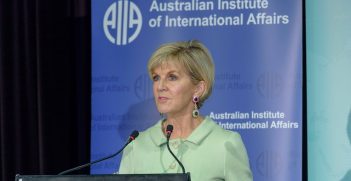Smart, Patient and Slow Engagement in Asia

Professor Ien Ang
Engagement with Asia on all levels – trade, cultural and scientific – is about connections. But being “smart” and sustainable is a complex and lengthy process.
As the rise of Asia continues apace, Australia needs to become more deeply engaged with the region than ever before. Most recently the previous government highlighted this requirement with great fanfare with its White Paper ‘Australia in the Asian Century’ (2012). The current government shelved this policy document as soon as it came to office, but the rollout of its New Colombo Plan – which allows Australian undergraduate students to spend a term at an Asian university – shows that it is equally mindful of the cause. Foreign Minister Julie Bishop has said that she would like to make study in Asia ‘a rite of passage’ for Australian students. Building such sustained links with Asia will enhance Australia’s connectivity within a rapidly changing and increasingly interconnected region.
This is a nice ambition, but the reality is still a long way off. Australians are still far more oriented towards Europe and North America than to the countries of Asia. Although two-way trade with Asia has been steadily growing, most businesses still believe that engaging with Asia is ‘too hard’. Australia invests more in New Zealand than in China, Indonesia, or all ASEAN countries combined. The appetite for learning Asian languages remains stubbornly low in Australia.
Overall, there is still too much short-termism, opportunism and excessive focus on monetary gain in Australia’s dealings with countries in the region. To overcome this, we need smart engagement with Asia. Smart engagement involves working towards nurturing wide-ranging, long-term, deep and sustained relations, based on the principle of reciprocity. Far from being a quick fix (as the word ‘smart’ is too modishly associated with), it means patiently growing the connections between people and institutions through partnerships and collaborations which enhance mutual trust and understanding. The Australian Council of Learned Academies (ACOLA) report Smart Engagement with Asia sets out how we can leverage language, research and culture to achieve this goal.
The need for smarter engagement has been put into sharp relief with regard to Indonesia, a country with which Australia has had a consistently cool and often fractious relationship, despite its obvious importance as our closest neighbour. Smart engagement with Indonesia would mean building understanding among Australians that there is more to this country than a great holiday in Bali.
Long-term collaboration between the CSIRO and Indonesian research partners on marine fisheries is an example of such smart engagement. Over a period of more than twenty-five years the collaboration has evolved from an arrangement of Australians training Indonesians to one of equal and mutually beneficial partnership, where the Indonesian partner institution, the Research Centre for Fisheries Management and Conservation, has become the lead organization of the research program. Australian competence in Bahasa Indonesia greatly facilitated the success of the collaboration, as well as the development of congenial people-to-people links and appropriate cultural knowledge (such as not scheduling major meetings on a Friday because of Friday prayers).
Thus, smart engagement requires breaking the vicious circle of (English) monolingualism in Australia: although English is increasingly widely spoken throughout Asia, it is foolish to think it is enough for effective, in-depth communication. Smart engagement also depends on investment in deepening cultural relations.
Being the only country in the region with a predominantly European heritage (apart from New Zealand), Australia’s relationship with neighbouring countries is characterised by a sense of cultural distance, which has persisted despite strong growth in trade. But it is important to realise that this sense of distance is mutual: most Asian countries lack substantial knowledge about contemporary Australia, and outdated stereotypes prevail. In China an informal poll found that impressions of Australia were extremely sketchy and focused on koalas and kangaroos, and in India the perception that Australia is a racist country remains widespread. As DFAT secretary, Peter Varghese, observes, Australia suffers from a distinct soft power deficit in the region.
Improving this situation is the work of cultural diplomacy. But simply showcasing Australian culture in Asia – e.g. by staging major arts performances or exhibitions – is not the best approach to engaging with Asian audiences. Instead, approaches which stress reciprocal cultural exchange and collaboration are more likely to instill genuine, long-term mutual familiarity and understanding.
A particularly visionary example is the Asia Pacific Screen Academy, established as an initiative of the City of Brisbane in 2008, which brings together filmmakers from across the region to foster regional dialogue, exchange and collaboration. The organisation presents the APSA Awards, an annual film competition modelled after the glamorous Oscars, to promote the films and filmmakers of the Asia Pacific to global audiences, while magnifying the vital role of film in promoting mutual understanding. By facilitating regional connectivity, APSA institutionalises a regional sense of community and promotes Australia’s role as an engaged regional citizen.
In short, smart engagement with Asia is already undertaken by myriad Australian scientists, researchers, artists and cultural professionals, often originating as small-scale initiatives powered by individual passion and effort. Such initiatives deserve support and appropriate resourcing in order to flourish. In this regard, the role Asian diasporas in Australia can play in bridging countries is particularly important, though often overlooked. They often have the linguistic skills, cultural knowledge and social networks, which help connect Australia and Asia. Diaspora diplomacy is therefore a central component of a national smart engagement strategy.
Professor Ien Ang from the Institute of Culture and Society at the University of Western Sydney is the co-author of Smart Engagement in Asia, a report commissioned by the Australian Council of Learned Academies (ACOLA) as part of the Securing Australia’s Future series.





